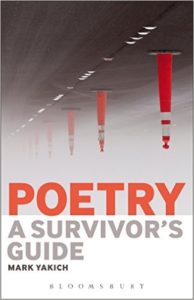Poets, or most of them, take their work seriously. You can read interviews in Poets & Writers, American Poets, and The Poetry Society in the U.K., and you know that poetry is serious business, and serious work. It is serious business even for the poets who use humor in their poems and in reading them, like Billy Collins.
So it is a bit disconcerting to start reading Poetry: A Survivor’s Guide by Mark Yakich and find this in the introduction: “The first poem I remember hating was Coleridge’s Kubla Khan, on which I had to write a report in 10th grade.” We soon discover that Yakich hated Matthew Arnold’s Dover Beach almost as much. And that he took only one English course in college. And that he had read only three novels by the time he was 25.

He’s learned a few things since 10th grade, and loves poetry. His wry irreverence underscores how much he loves poetry: “The very best way to read a poem is perhaps to be young, intelligent, and slightly drunk.”
As I read, and often laughed, my way through Poetry: A Survivor’s Guide, I found myself thinking about Mark Twain, who often exhibited a similar kind of loving irreverence (and sometimes not-so-loving).
The book is about two things: reading poetry and writing poetry. Within those two major sections, individual entries are relatively short, with titles like “Accessibility, ” “Emotion, ” “Metaphor, ” “Form, ” “Self-Expression, ” “Imitation, ” and “The Workshop.” Gradually we understand that this is a how-to book, but it is a different kind of how-to book, urging the reader to consider poetry as a serious subject but not to take one’s self—the poet—too seriously.
Yakich takes on a few of the widely held beliefs, or religious tenets, of contemporary poets. “The idea that a poem can be interpreted in an infinite number of ways is patently false, ” he says. And “a poetic style is something to cling to until it’s outgrown. Some styles, like bad seeds, never grow.” And this: “Reading a poem aloud in a classroom is sometimes uncomfortable. The teacher should make it more so.”

Mark Yakich
Yakich received a B.A. degree from Illinois Wesleyan University, an M.S. degree from Indiana University, a Masters of Fine Arts degree from the University of Memphis, and a Ph.D. degree from Florida State University. He has published four poetry collections: Unrelated Individuals Forming a Group Waiting to Cross (2004); The Making of Collateral Beauty (2006); The Importance of Peeling Potatoes in the Ukraine (2008); and A Meaning for Wife (2011). He is also a co-editor of Airplane Reading, an online journal of storytelling focused on the experience of flight.
Poetry: A Survivor’s Guide is filled with helpful advice, anecdotes, examples—and humor. Yakich takes his subject seriously (he does, after all, make a living writing and teaching it), but he also sees the fun in it. Poetry is part of life, in all its glorious wonder, awe, joy, tragedy, and ridiculousness, and Yakich would say that’s how we should read it and write it.
Related:
Reading a Poem: 20 Strategies – Mark Yakich writing in The Atlantic.
Yakich’s interview with Press Street.
Photo by Heinrich Plum, Creative Commons, via Flickr. Post by Glynn Young, author of the novels Dancing Priest and A Light Shining, and Poetry at Work.
__________________________

“I require all our incoming poetry students—in the MFA I direct—to buy and read this book.”
—Jeanetta Calhoun Mish
- “Your Accent! You Can’t Be from New Orleans!” - October 9, 2025
- Poets and Poems: Donna Vorreyer and “Unrivered” - October 7, 2025
- Poet Sidney Lanier and the Lost Cause - October 2, 2025

Mary Harwell Sayler says
What an excellent book for poets to read! Thanks, Glynn, for introducing us.
Glynn says
Mary – thanks for reading the post – and the comment!
Maureen says
I like Yakich’s ’20 Strategies’; it’s a good summary of his approach.
Glynn says
It is. What I really like about the book is both its practicality and its humor. Thanks for the comment, Maureen!
Megan Willome says
Just read the piece in The Atlantic. I starred a lot of things, especially “A poem cannot be paraphrased.”
Glynn says
Thanks for the comment, Megan!
Bethany says
I’m always on the hunt for humor. Finding it coupled up with poetry absolutely gets my attention. Hooray! Thank you for this, Glynn.
Glynn says
Yakich has a very wry sense of humor – saying things that suddenly hit you so that you go back and make sure it’s what you read. And then you smile or even laugh out loud.
Prasanta says
“The very best way to read a poem is perhaps to be young… and slightly drunk.” Well, I’ve been doing it all wrong, haha! (just kidding!)
I enjoyed reading this and the 20 Strategies. Thank you, Glynn.
Glynn says
I have to say, I no longer have the option of reading poetry when I’m young, and I’ve never tried it slightly drunk. In fact, the last time I was slightly drunk was when I was young. Thanks for the comment!